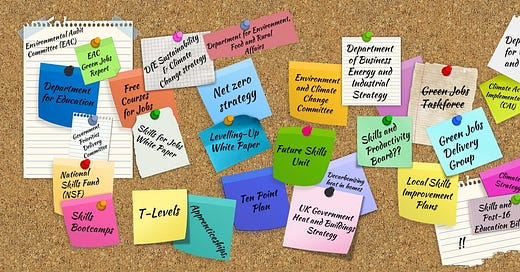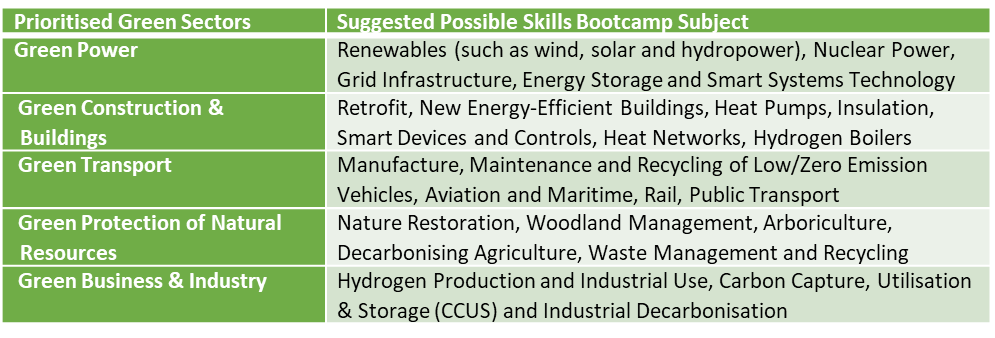Y-e-e-s, Minister
When it comes to green skills, a letter from the Minister for Skills goes some way towards laying out the Government's priorities. We have a few comments...
In our January post Which platform, please?, we commented that government coordination of green skills training and education all seems a little piecemeal. We expressed the hope for some joined-up thinking at government level, perhaps between Greg Hands, Minister for Energy, Clean Growth and Climate Change at BEIS and Alex Burghart, Minister for Skills at the DfE.
Following the post, we emailed the two ministers for their comments on the article. While they both initially told us their constituency workloads were too high to respond, we did eventually get this letter back from Alex Burghart. We thank the Minister for his reply.
It is not our intent to pick holes – we like to think that is not Green Edge’s style – but we do have a few comments and suggestions. Not least, we find it interesting in laying out the priorities in the minds of government right now in skilling up the country for Net Zero.
In particular, we find the emphasis in the first half of the letter on the Green Jobs Delivery Group to be significant. Not a lot seems to be known about this Group as yet – at least, we haven’t been able to find much. We do know that the Government’s response to the recommendations made by the Environmental Audit Committee’s (EAC) Green Jobs report majored on the Group’s launch in November 2021. The response indicated that the Group would take up where the Green Jobs Taskforce (now disbanded) left off: it will “be active for the duration of this Parliament and will aim to drive forward industry and government action across a range of topics”.
But we also know that the EAC was less than happy with this response. At the end of January, EAC’s Chairman, Rt Hon Philip Dunne MP (C), said:
“When we published our report in October, we expressed concern that the Government’s grand ambitions to deliver two million green jobs lacked policy detail. This is sadly borne out in the response”.
The EAC chairman went on to criticise “[t]his Government’s current piecemeal approach to green jobs” and the lack of a central coordination function. He also noted that the national curriculum is not embedding the teaching of environmental sustainability and nature into schools. Interestingly, our letter from Alex Burghart states (in paragraph 1) that the Net Zero Strategy “sets out how the Government’s skills reforms will support teachers understanding of sustainability”. Perhaps the DfE’s draft Sustainability & Climate Change strategy intends to address all that, but as we say in this recent Green Edge post, if they want it to start in 2023 they’d better be cracking on with it in short order. And as one of our subscribers, Vivienne Horwood (who we know to be knowledgeable about these things) wrote in a comment to the post: “although a single A level [Environmental Science, given specific mention in the Net Zero Strategy] exists focusing on these crucial issues, how is this being promoted to schools, and how many teachers and schools are in a position to offer it? Figures for last year show just over 1000 students taking the A level, with previous 3 years approx 800 per annum”.
So, not a huge number yet, then.
That said, in a spirit of positivity so often not seen in public life and media communications these days, together with an acknowledgement of government commitments to assisting the response to the tragedies of the Ukraine – but also with a concern that the Government does not take its eyes off the net zero ball while such big things are going on in the world – Green Edge offers the following opinions. Call it our two penn’orth (we still remember old money here at Green Edge):
1. Leadership and co-ordination
The Green Jobs Delivery Group seems to be the right thing to put in place to steer and coordinate the green skills agenda - but it must include the departments of Transport, and Levelling-Up, Housing and Communities, which both have important roles to play. The recent Levelling-Up White Paper announced the creation of a Future Skills Unit, to be located in the DfE. This Unit should play an important role in collating and creating forecasts of near- and medium-term skills requirements, and help to shape green skills policies. But where is the Skills and Productivity Board in all this? Still seeing nothing from them.
Scale and pace are important too. This was a key point raised by the Climate Change Committee's assessment of the UK Government's Heat and Buildings Strategy.
2. The importance of place
In the course of our work, we have found great examples of individual and local initiatives across the UK which have major contributions to make to the national green skills agenda. Two examples: the 180-member Aberdeen Renewables Energy Group is helping to shape the transformation of the Northeast Scottish economy and build on its unique capabilities in maritime and energy; and the Maritime Skills Commission operates at harbour-level and across the whole maritime transport sector.
3. The importance of systems skills and eco-systems of skills
Transforming traditional sectors to take full advantage of the move to net zero requires skills which cut across existing systems and integrates both legacy and new technologies. Often, technology integration relies upon an eco-system of skills from a range of actors. Our recent articles on BAR Technologies (a maritime technology business building on F1 technology), Barter for Things (an IoT business), and Portsmouth International Port all touch on the pooling of green skills to solve complex problems and to generate low cost, reliable solutions.
4. Bootcamps as a market intervention
We see great merit in the Bootcamp approach as a way of building skills via short training and development programmes. The Wave 3 Skills Procurement call for new bootcamps includes a Green Skills section (Lot 7) which prioritises these sectors:
We hope the selected providers will design flexible bootcamps that properly utilise the on-the-job component – something we hear has been missing so far in some of the current bootcamps. Also, we hope they recognise the systems approach to problem solving, so much needed to understand context and the big picture approach to the green economy.
5. DfE’s Sustainability and Climate Change Draft Strategy
This seems ok as far as it goes and it will be interesting to see how it changes in its full release (due April 2022). We hope it takes on board what others have learnt about the multi-disciplinary requirements of sustainability and climate change. Here, our recent conversation with Primary Engineer, along with firms like Make Tomorrow show how this strategy could be implemented and from where much of the content could be sourced.
Would you like to share your knowledge and experience of green skills on The Green Edge? If so, please drop us a line at greenedge@bluemirrorinsights.com.
The Green Edge is looking for sponsors! Benefits of sponsorship include adding your voice to the newsletter and becoming part of our Green Edge Advisory Group. For more information, please contact us at the same address.









Great overview (as ever) Fraser and Michael. Do you see the external (Ukraine/energy/cost of living crisis) as causing delays to action on this, or is it stemming more from internal (net zero as the new Brexit) pressures? I guess it may be neither, and just slow pace of progress generally. Whatever the cause, not [climate] emergency thinking by the looks of it.